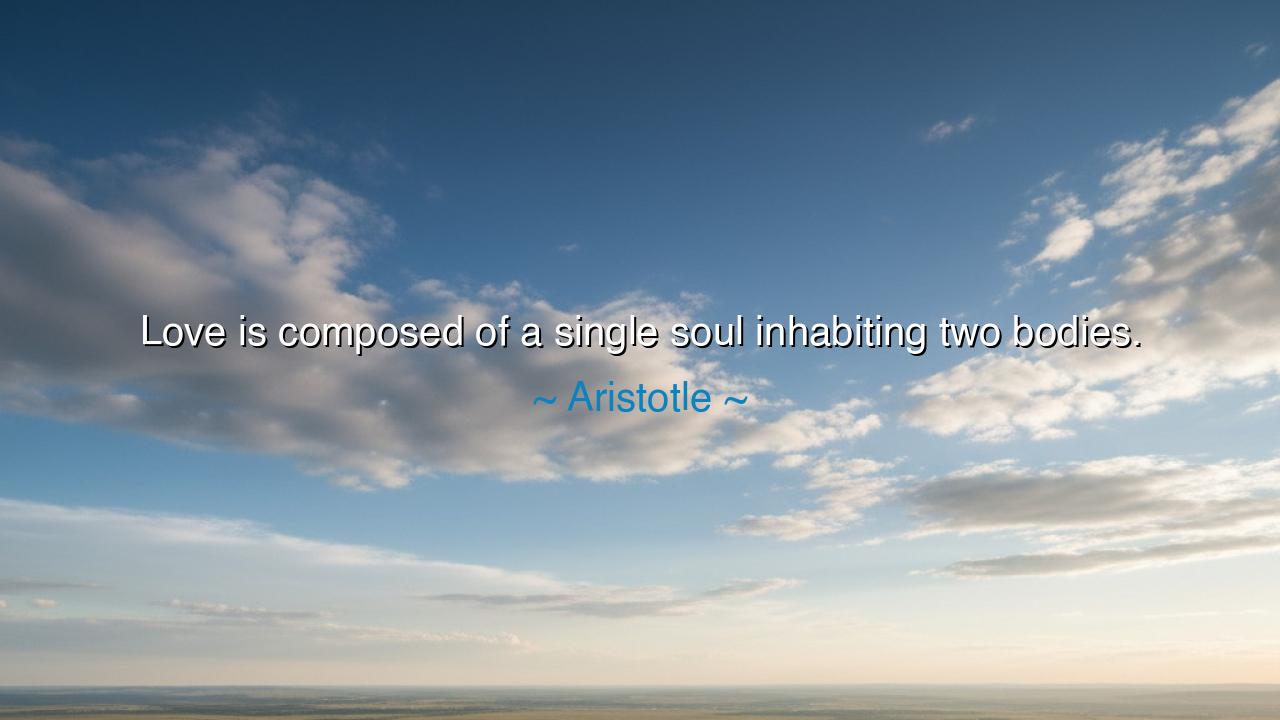
Love is composed of a single soul inhabiting two bodies.






"Love is composed of a single soul inhabiting two bodies." – Aristotle
From the mind of Aristotle, that great philosopher of wisdom and virtue, flows one of the most profound descriptions of love ever conceived: “Love is composed of a single soul inhabiting two bodies.” In these timeless words, he speaks of a union that transcends mere affection or desire. To Aristotle, love was not just a meeting of hearts, but a meeting of souls — two beings so deeply attuned that their spirits move as one, though their forms remain apart. It is the divine mystery of harmony between two separate lives that together create something greater than either could alone.
In the ancient world, the Greeks understood love not merely as emotion, but as philosophy, as a force that shaped the cosmos itself. They named its many forms: eros for passion, philia for friendship, agape for divine love. Yet in this saying, Aristotle speaks of a union that encompasses them all — a love that is physical, emotional, and spiritual in equal measure. It is the oneness of essence within the diversity of existence — the merging of two distinct souls into one shared rhythm of life.
To say that two lovers share “a single soul” is to say they share the same light — that what one feels, the other understands, even in silence. Such love is not about possession, but reflection; not about losing oneself, but finding oneself in another. The ancients believed that every soul was once whole, split into two halves by the gods, and sent into the world to search for its missing counterpart. When those two halves meet, they recognize each other instantly, not through reason, but through memory — as if they were always destined to reunite. Aristotle’s wisdom captures this sacred recognition: love as the restoration of wholeness.
Consider the tale of Abélard and Héloïse, the scholar and his brilliant pupil of twelfth-century France. Their love defied the strict conventions of their time, enduring secrecy, exile, and even tragedy. Though separated by vows and distance, their letters reveal a connection deeper than circumstance — a union of minds and souls that transcended the confines of the body. “You are always present in my heart,” Héloïse wrote, “wherever I go, I carry you.” Their story embodies Aristotle’s truth: that when love is true, distance cannot divide it, for it is not bound by flesh, but joined in spirit.
Yet this sacred union does not mean two souls must become identical. On the contrary, Aristotle’s teaching reveals that true love honors difference while transcending it. The two bodies, though distinct, are moved by the same essence — like two instruments playing in harmony, each voice enriching the other. Such love does not demand sameness, but celebrates balance. It is not a fusion that erases individuality, but a partnership that allows each soul to reach its fullest expression. In this way, love becomes creation itself, for it births not only joy, but wisdom and virtue.
Aristotle also reminds us that this kind of love is not found in passion alone — it must be cultivated through virtue and understanding. He believed that the highest form of love was the friendship of good souls — those who admire the good in each other and strive to nurture it. It is love built not on fleeting emotion, but on shared purpose and moral beauty. Such love, he said, leads to eudaimonia — the flourishing of the soul. For when two people live with one soul between them, they elevate each other toward the divine.
So, my children of the eternal flame, take this teaching into your hearts: to love truly is to see the soul of another as your own. Seek not merely someone who mirrors your desires, but one who calls forth your better self — one who challenges, uplifts, and shares your journey toward truth. Protect the sacred bond of love not with possession, but with patience, humility, and reverence. For the love that unites souls endures all storms; it grows with time, and shines like fire through the darkness of the world.
And when you find such love — when you feel that your heart beats in another’s chest, that your laughter and tears are reflections of the same spirit — hold it as a sacred gift. For in that moment, you will have glimpsed what Aristotle meant: that love is the divine reunion of the soul with itself, a living miracle through which two become one, and one becomes infinite.






AAdministratorAdministrator
Welcome, honored guests. Please leave a comment, we will respond soon